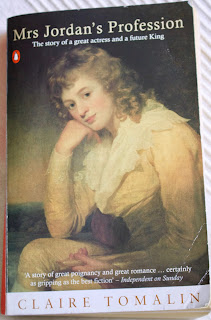
I have read another excellent biography by Claire Tomalin. The first one was about Charles Dickens and this is about Mrs Jordan, one of the best known actresses of her time. Claire Tomalin creates a fascinating and vivid portrait of a remarkable woman.
Dorothea Bland was born on 22 November 1761, as one of six siblings. It is not clear whether her parents Francis Bland and Grace Phillips were married. Her mother was an actress and that is the career that Dorothea, or as she was commonly known, Dora, entered into. She was very talented, worked her way up towards the stages of London. But it started on the darker side.
She was raped by a friend of the family, became pregnant and gave birth to her first daughter Frances, or Fanny, when she was hardly more than a child herself. After some years touring the countryside she came to London and success was almost immediate. She met Richard Ford, a police magistrate and lawyer, moved in with him and got three daughters. She left him several years later because he did not want to marry her. By this time she was very famous and made good money, so could afford to move into a house of her own.
It is at this point that she meets Prince William, the Duke of Clarenden, and he gets infatuated by her. His is the third son of King George III, a little bit of a fallout who does not really find a purpose in life. When the public found out about their relationship, they were given a hard time. For a long time the papers were full of caricatures of the couple. However, they seemed to have been very happy together.
"An her effect on him was tonic. Not only was her dedication to her work exemplary, she also provided a centre and order to his life. She gave him good advice. Under her tactful guidance he largely gave up drinking - the exception being when he visited the Prince of Wales, which meant being on what Dora called 'hard duty' in that department. She teased him and even quarrelled with him, but she was loyal and constant."
She must have been a formidable person. She got ten children with Prince William and worked at the same time. She hardly ever rested from the theatre, only a couple of days when she went into labour. She strikes me as a very modern woman who had to divide her time between her work, family, the Duke and her children.
The King and Queen had fifteen children, but only one legitime grand child, by the Prince of Wales. The other sons did not have children and the King refused his daughters to marry. There must have been a something special though for the Royal family to see all the children of Prince William.
"There was no official royal acknowledgement of Dora's children; but a very slight unbending or softening towards them began to show itself from the time they settled at Bushy."
She continuously worked and seemed still to have debts. The Duke was not a person who could handle money, so her money came in handy. She was a very generous person and money went easily away. It ended with her having to tour the country in the summer and leave her children behind. As the year passed the Duke and Dora became estranged and they separated in 1811 after an affair of 20 years. They remained friends but did not have too much contact. All their daughters married well and the sons were mostly successful in their careers. Her earlier daughters did not marry that well. Two of the sons-in-law used her generosity and fooled her out of her money. To avoid prison due to debt she temporarily left for France. However, she could not come back and died there in poverty on 5 July 1816.
It is a very interesting and exciting story of a life of a young girl who made it all happen. She seems to have been happy most of her life, and the theatre was her number one love. Acting was her main interest in life, and she was very good, as is suggested by her popularity. She managed though to combine working life with family life in a quite modern way. Tomalin manages to show us high and low, theatre and home, the rich world and the poor one. It is a fascinating portrait she provides in Mrs Jordan, and she paints a wonderful portrait of a lady that was great at what she was doing. And she was doing it all on her own.






Comments
Post a Comment